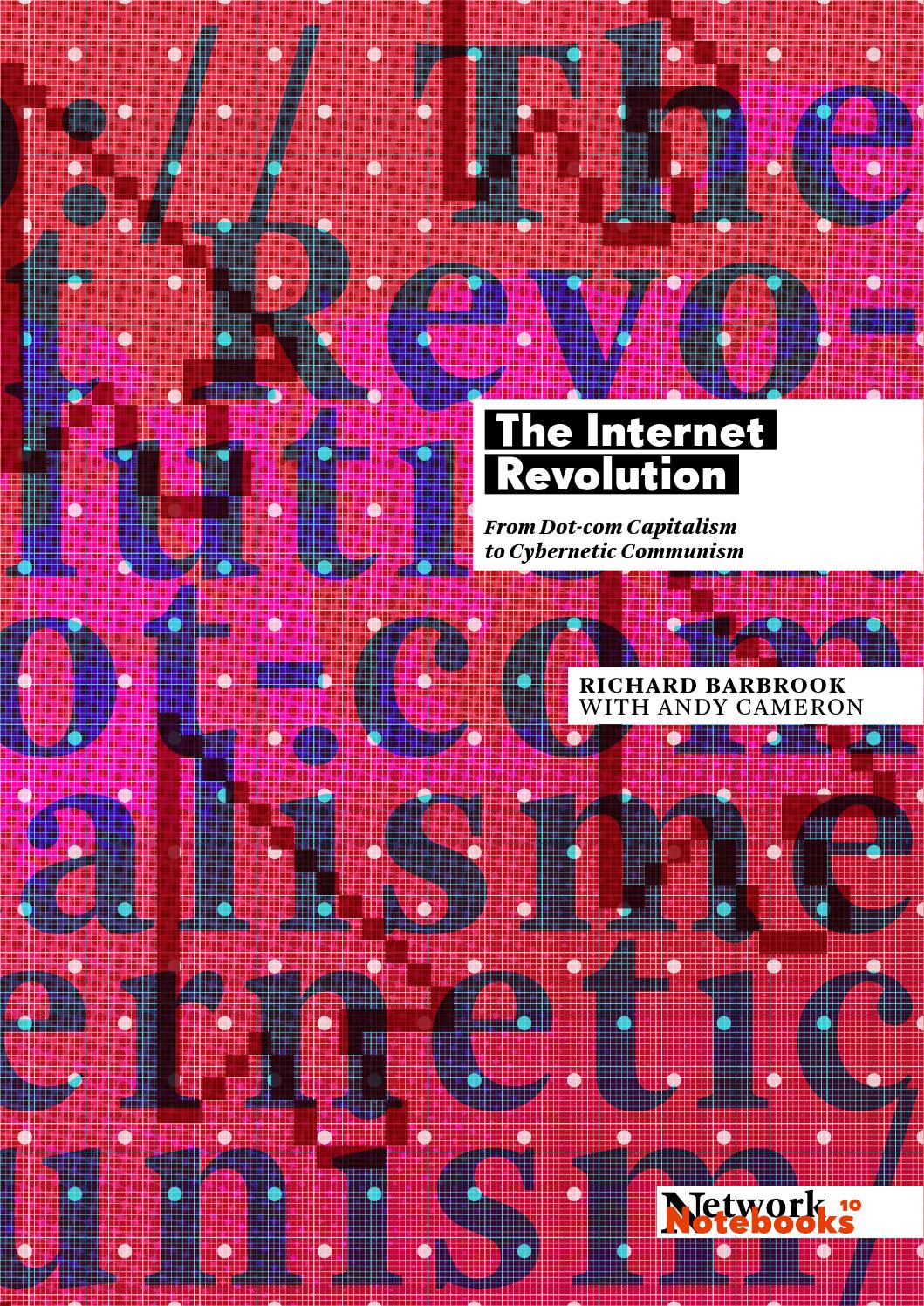Richard Barbrook with Andy Cameron: The Internet Revolution: From Dot-com Capitalism to Cybernetic Communism (2015)
Filed under book | Tags: · californian ideology, capitalism, communism, cybernetics, cyberspace, internet, libertarianism, neoliberalism, net criticism, silicon valley, technology, virtual reality

“Richard Barbrook and Andy Cameron’s The Californian Ideology, originally published in 1995 by Mute magazine and the nettime mailinglist, is the iconic text of the first wave of Net criticism. The internet might have fundamentally changed in the last two decades, but their demolition of the neoliberal orthodoxies of Silicon Valley remains shocking and provocative. They question the cult of the dot-com entrepreneur, challenging the theory of technological determinism and refuting the myths of American history. Denounced as the work of ‘looney lefties’ by Silicon Valley’s boosters when it first appeared, The Californian Ideology has since been vindicated by the corporate take-over of the Net and the exposure of the NSA’s mass surveillance programmes.
Published in 1999 at the peak of the dot-com bubble, Richard Barbrook’s Cyber-Communism offers an alternative vision of the shape of things to come, inspired by Marshall McLuhan’s paradoxical ‘thought probes’. With the Californian Ideology growing stronger, the Net was celebrated as the mechanical perfection of neoliberal economics. Barbrook shows how this futurist prophecy is borrowed from America’s defunct Cold War enemy: Stalinist Russia. Technological progress was the catalyst of social transformation. With copyright weakening, intellectual commodities were mutating into gifts. Invented in capitalist America, the Net in the late-1990s had become the first working model of communism in human history.
In an introduction written specially for this 20th anniversary edition, Richard Barbrook takes a fresh look at the hippie capitalists who shaped Silicon Valley and explains how their influence continues to this day. These thought probes are still relevant in understanding the contradictory impact of ubiquitous social media within the modern world. As McLuhan had insisted, theoretical provocation creates political understanding.”
Publisher Institute of Network Cultures, Amsterdam, Oct 2015
Network Notebooks series, 10
Creative Commons Attribution-NonCommercial-ShareAlike 4.0 International License
ISBN 9789492302014
51 pages
Replies to ‘The Californian Ideology’ published in Mute 4 (Spring 1996): Introduction, Louis Rossetto (Wired’s editor-in-chief), Franco (Bifo) Berardi, Celia Pearce.
PDF, PDF (4 MB)
EPUB, EPUB (3 MB)
Issuu
Laboria Cuboniks: Xenofeminism: A Politics for Alienation (2015) [EN, DE, ES, RO, IT, RU, SK, SL, SW, FR, PT, FA, PL, DK]
Filed under manifesto | Tags: · alienation, capitalism, feminism, gender, manifesto, politics, technology

“Ours is a world in vertigo. It is a world that swarms with technological mediation, interlacing our daily lives with abstraction, virtuality, and complexity. XF constructs a feminism adapted to these realities: a feminism of unprecedented cunning, scale, and vision; a future in which the realization of gender justice and feminist emancipation contribute to a universalist politics assembled from the needs of every human, cutting across race, ability, economic standing, and geographical position. No more futureless repetition on the treadmill of capital, no more submission to the drudgery of labour, productive and reproductive alike, no more reification of the given masked as critique. Our future requires depetrification. XF is not a bid for revolution, but a wager on the long game of history, demanding imagination, dexterity and persistence.” (opening paragraph)
First published June 2015
GNU Public License
Commentary: Isabel de Sena (2019).
Xenofeminism: A Politics for Alienation: HTML, TXT, PDF (English)
Xenofeminismus. Eine Politik für die Entfremdung: HTML, TXT, PDF (German)
Xenofeminismo. Una política por la alienación: HTML, TXT, PDF (Spanish)
More translations (Romanian, Italian, Russian, Slovak, Slovenian, Swedish, French, Portuguese, Persian, Polish, Danish; added on 2019-3-6)
Laura Bear, Karen Ho, Anna Tsing, Sylvia Yanagisako: Gens: A Feminist Manifesto for the Study of Capitalism (2015)
Filed under manifesto | Tags: · anthropology, capitalism, feminism, gender, kinship, manifesto
“Our title signals a major redefinition of the multilayered historical meanings of the term gens. Gens began as the Roman concept of a family unit descended from a common male ancestor and was scaled up to social distinctions like aristocratic lineage. It was transformed by Lewis Henry Morgan to found the anthropological study of kinship and reveal the “original” matriarchal origins of community. Friedrich Engels then drew on Morgan to argue that the patriarchal form of gens led to the end of matriarchal systems. Gens is also, of course, the etymological root of gender, genus, genre, generations, and generate. We find this term broadly helpful because it carries a long history of the appropriation of human and non-human life-forces by social forms. Its varied usage inspires reflection on the depictions of these life-forces that in turn contribute to forms of social inequality. Moreover, it specifically refers to a history of contradictions between male authority and female kinship ties that signals the mix of capture and generativity that characterizes all social power. Finally, by adopting this term, we play with the irony that a patriarchal unit provides the root for the word gender even as we found our approach to capitalism on a more liberating (but hidden) ancestry of feminist analyses of gender, kinship, and race, as well as other forms of epistemological insights garnered from the margins.” (opening paragraph)
Part of the series Generating Capitalism, Fieldsights – Theorizing the Contemporary, Cultural Anthropology Online, March 2015.
Commentary: Donna Haraway (EnviroHumanities 2015, see note 16)
Comment (0)
